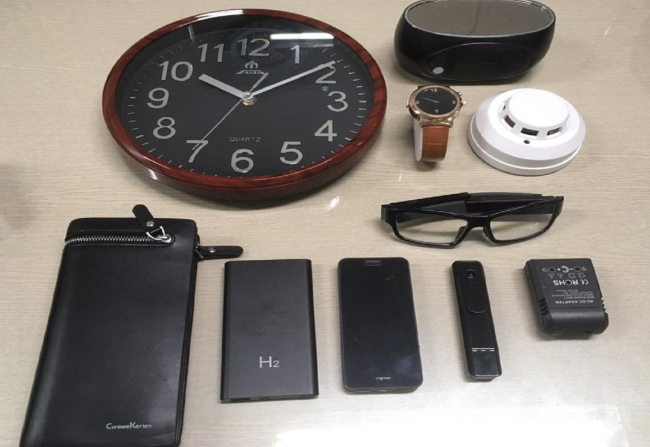Peeping toms are making daily headlines, and many South Korean women fear that there is no escape from their use of hidden cameras.
The fear is not just of becoming a victim, but that the footage -- taken in places ranging from subway stations and swimming pools to hotels and public toilets -- may be shared on social media.
With the calls rising for stronger measures to grapple the issue, the government has announced a comprehensive plan to curb such crimes, but questions remain as to its effectiveness.
“I am always on alert on subways, and public facilities and restrooms,” Hwang Seul-gi, a female office worker in Seoul told The Korea Herald.
“It would be horrible if such footage of myself spreads online, and even just the thought of the possibility is enough to generate great fear inside me.”
Ria Ma, a 24-year-old English teacher also said that many women, including herself, feel concerned about being filmed.
“It became a habit to look around and check for any device taking videos, in restrooms and accommodation,” she said.
Videos of sexual and other private activities taken secretly and circulated online attracted increased public attention about a year ago, when the authorities shut down Soranet, the nation’s largest porn site at the time.
The online community offered mainly voyeur photographs and videos of so-called revenge porn. Most of the content circulated through the website was considered likely to have been taken or uploaded without the consent of the women appearing in them.
But the crackdown on Soranet has done little to address the wider problem, with the number of such crimes -- taking illicit videos without consent and distributing them online -- continuing to rise.
According to the National Police Agency, the number of cases leading to arrest came to 2,400 in 2012, but jumped to reach 7,623 three years later. As of August this year, 3,914 offenses have been reported.
Aware of the gravity of the situation, President Moon Jae-in has called for comprehensive measures to curb “hidden camera crimes.”
“We need to come up with stronger punishment against the criminals and come up with special arrangement for the victims,” he said in a Cabinet meeting on Aug. 8.
On Sept. 27, the government announced a set of plans to prevent and punish such digital sex crimes, which include conducting regular inspections of public facilities and stronger regulations to stop import, sale and possession of cameras modified for illegal purposes.
The measure also includes stronger punishment for those spreading revenge pornography, including imprisonment of up to five years. Circulating videos without consent will also be punishable with up to seven years in prison.
Despite the government’s resolve to take on the issue, experts say it will not be an easy fight.
Technology has made hidden cameras more difficult to identify, with miniaturized devices now coming in all shapes and sizes. They are designed to resemble car keys, pens, spectacles and watches, among other things.
For the victims, the matter becomes much more serious once videos are posted online. After they are uploaded it becomes almost impossible to stop them from spreading.
A lawmaker called for a special investigation system to be introduced for the victims to prevent secondary damage.
“The government said it would provide funds to remove such videos, but the internet makes redistribution too easy,” Rep. Song Hee-kyoung of Liberty Korea Party said.
According to government data revealed by the first-term legislator, the Korea Communications Commission has received more than 15,000 requests to have such videos removed from online during the past three years.
But only 3.7 percent, 570, were erased. The average number of days it took for them to be deleted was also 10.9 days.
The Seoul Metropolitan Police Agency conducted a monthlong crackdown in September to detect hidden cameras in 1,474 public facilities. But they announced on Saturday they had not found a single camera.
The inspection areas include 290 subway and train stations, five bus terminals 660 public toilets and 90 universities.
"We received the budget to buy devices to detect such hidden cameras only this year, and bought 92 of them,” Han Ye-ri at the National Police Agency told The Korea Herald.
“The 92 detectors are not enough for the whole nation. While it would be good if we can actually catch the cameras, we aim for our efforts and inspections to reassure citizens and possibly prevent further crimes.”
When asked about future plans to make regular the inspections, she said it was likely but nothing had been decided yet.
Lee Su-jeong, a professor of criminal psychology at Kyonggi University stressed that a fundamental solution can only come when society changes.
“The hidden camera crime trend now is not a matter to be dealt with as psychological voyeurism. There are already illegal routes to distribute illicit footage and it is not too much to say it has formed an industry,” she told The Korea Herald.
“Society should openly discuss and draw a conclusion that it is not okay to sell such illicit videos. Without a comprehensive view change, the government’s countermeasures would only have a temporary effect.”
By Jo He-rim (
herim@heraldcorp.com)







![[Today’s K-pop] Blackpink’s Jennie, Lisa invited to Coachella as solo acts](http://res.heraldm.com/phpwas/restmb_idxmake.php?idx=644&simg=/content/image/2024/11/21/20241121050099_0.jpg)
